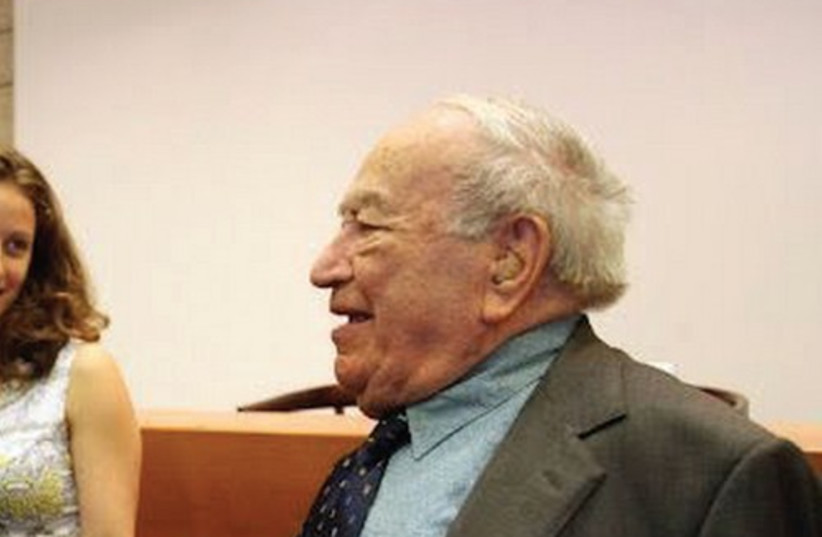Six outstanding doctoral students in the exact sciences, mathematics and life sciences received Adams Fellowships of NIS 100,000 a year and full exemption from tuition in Jerusalem on Thursday. Most recipients are aged 26 to 34. Sixty percent of the alumni are in faculty positions in academia, mostly in Israel, and the remaining 40% are in research at high-tech and bio-tech companies, mostly in Israel.
The generous fellowship program donating $1 million a year was established in 2005 by Marcel Adams of Canada, who died two years ago just nine days after celebrating his 100th birthday, and is administered by the Israel Academy of Sciences and Humanities.
Adams Fellowships are granted annually to graduate students at the beginning of their doctoral studies, for a period of up to four consecutive years. The candidates are proposed by their institutions of higher learning. Usually, they have completed their first year of studies before receiving the fellowship, either on a direct doctoral track or after completion of a second degree.
In addition to the fellowships and exemption from tuition, $3,000 are provided annually for active participation in international conferences and workshops, laboratory study abroad, international scientific collaboration or to interview for a postdoctoral position.
Adams Fellows are given the opportunity to network with their peers and create their own “community of young scientists” by attending events held by the academy with the participation of Fellows of all the classes, including alumni. These include an annual conference, an annual seminar featuring lectures by world-renowned scientists, science communication workshops and field trips.

The key to Israel's future
Adams viewed young Israeli scientists as the key to Israel’s future, targeting top-notch and highly-motivated young scholars chosen from all of the country’s research universities. Escaping from a forced-labor camp in Romania in 1944, he survived food shortages and arbitrary harassment by the authorities.
After coming to Israel with the Jewish Agency’s help in 1944, Adams settled in Pardes Hanna and took part in the War of Independence. He moved to Canada in 1951 and worked as a tanner before going into real estate. Feeling a debt to Israel and the Jewish people, he decided to establish the fellowship program.
His son Sylvan Adams, a Canadian billionaire who donates money for many medical, business, technology, sports and educational activities in Israel, was present at the Jerusalem ceremony.
Former Academy President Prof. Menahem Yaari described the agreement as one of the most important documents ever for the future of higher education in Israel. A professional committee at the academy reviews applications from doctoral students and chooses the awardees, for study in such fields as organic chemistry, molecular biology, chemistry, mathematics, engineering, physics, genetics, computer science and brain research.
Adams Fellowships recipients:
Eliana Steinberg, a doctoral student at the Hebrew University School of Pharmacy’s Institute for Drug Research. Born and raised in Jerusalem, she tutored elementary school pupils with learning difficulties and new immigrants and earned her B.Sc. degree at the School of Pharmacy. Feeling that it was important to implement what she had learned on a practical level, she worked as a licensed pharmacist for a year. Then, wanting to further pursue her passion for science and her desire to improve patients’ treatment from a different approach, she received her master’s degree, specializing in nanotechnology.
She is now studying for her doctorate at the Hebrew University, focusing on developing and perfecting 3-D tumor-on-chip models that accurately reproduce the environment and behavior of individual cancer tumors. These models can be key to the successful practice of personalized medicine; with the right model for the specific tumor, different drugs in different strengths can be tested on the patient-derived tumor cells to determine the best treatment for each patient.
Nitzan Aframian is a doctoral student in the Faculty of Life Sciences at Tel Aviv University (TAU). After doing five years of military service as an intelligence officer, he did his bachelor’s and master’s degree at TAU and is now exploring interactions between bacteria and the viruses that infect them. For his doctoral work, he is looking for ways in which bacteria defend themselves, hoping to uncover general principles of communication and cooperation with viruses and the genetics of an evolutionary arms race.
Amir Burshtein is studying at TAU’s School of physics and astronomy. Raised in Herzliya, he earned a bachelor’s degree in physics and electrical engineering and focused on data reduction techniques in 3D ultrasound imaging. He spent six years in the Israel Defense Forces Intelligence Corps. For his doctorate, he is developing theoretical methods to study simulations in an environment of superconducting circuits that could be used for condensed matter and high-energy systems.
Omer Granek of the physics faculty at the Technion-Israel Institute of Technology earned a bachelor’s degree in physics and math nd participated in various research projects ranging from control theory for engineering, optical analysis for medicine and fluid mechanics for marine biology. His current research focuses on the dynamics of passive objects immersed in fluids of active particles. He hopes to gain insight into general physical principles in far-from-equilibrium systems.
Shir Cohen is studying computer science at the Technion after developing a special interest in the impact of human behavior on technology. She studies broad aspects of reliability and security of distributed systems, with a focus on blockchains and other decentralized financial technologies. By finding efficient algorithms, she wants to improve the scalability and reliability of technology.
Matan Eilat is studying mathematics and computer science at the Weizmann Institute of Science in Rehovot. His curiosity was awakened by his mother, a math teacher, and after completing high school early, he went on to TAU for an accelerated program in mathematics. He joined an elite unit in the IDF’s Intelligence Corps, where he served for over four years. His research is in he field of Riemannian geometry and is interested in deducing geometric conclusions from partial metrical data.
